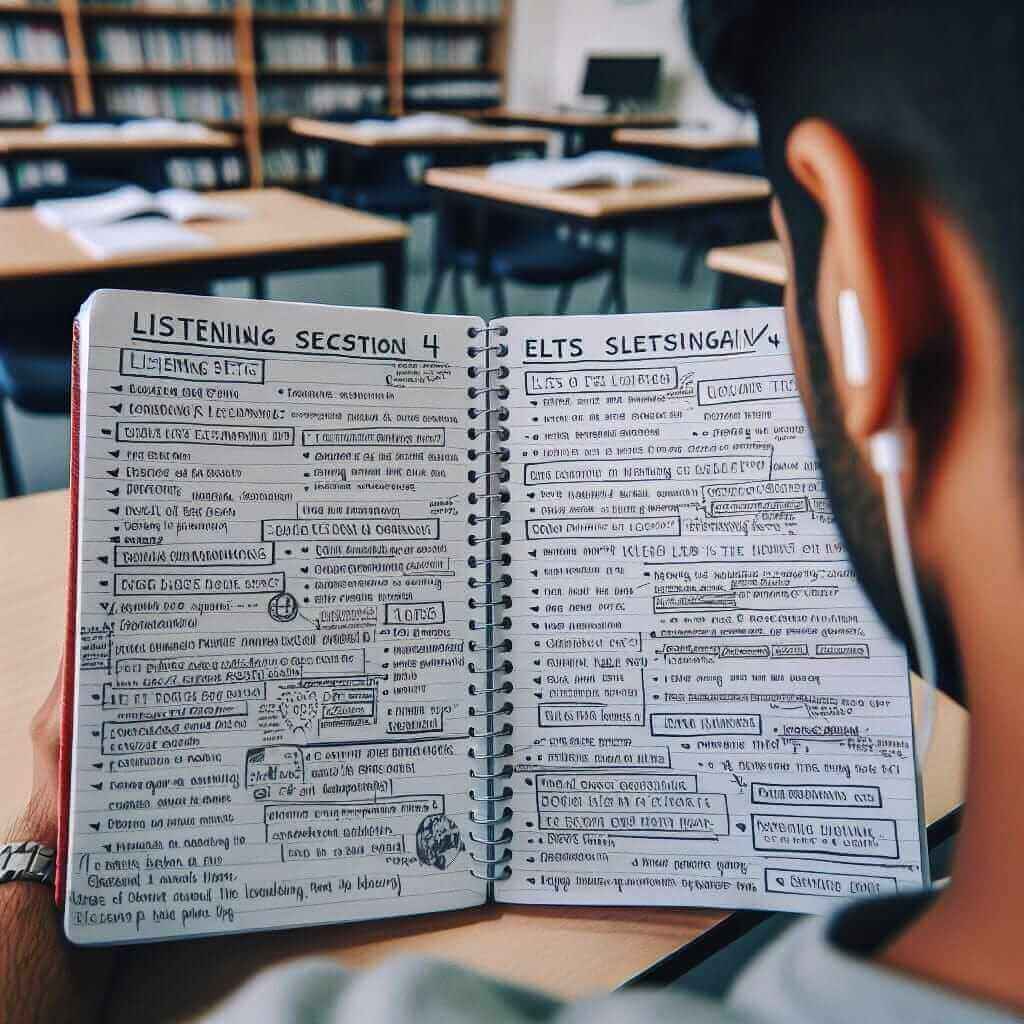The IELTS Listening test can be challenging, but Section 4 often feels particularly tough. Why? Because it features a single speaker discussing a complex academic topic, demanding your full concentration and astute note-taking skills. This guide is meticulously crafted to equip you with the strategies and insights needed to not just handle, but to excel in IELTS Listening Section 4.
Understanding the Challenge: What Makes Section 4 Unique?
Let’s break down the key features of Section 4:
- Single Speaker: Unlike previous sections with dialogues or conversations, Section 4 presents a monologue or a lecture-style speech. This requires sustained focus to follow the speaker’s line of reasoning.
- Academic Content: Topics are drawn from academic fields like science, history, sociology, or technology. You don’t need prior knowledge, but familiarity with academic discourse (e.g., lectures) is beneficial.
- Complex Language: Expect a higher level of vocabulary, potentially including technical terms. The speaker might also use complex sentence structures and idiomatic expressions.
- Faster Pace: The speaking rate in Section 4 tends to be faster than in earlier sections, further challenging your listening comprehension.
Essential Strategies for Success
Now that you understand the challenges, let’s explore the strategies to overcome them:
1. Enhance Your Academic Vocabulary
Why it matters: A robust vocabulary is your key to unlocking the meaning within complex academic passages.
How to do it:
- Read Widely: Immerse yourself in academic articles, journals, and textbooks across diverse fields.
- Note New Words: Maintain a dedicated vocabulary notebook. Jot down unfamiliar words, their definitions, and example sentences.
- Use Flashcards: Utilize flashcards for active recall and to test your retention regularly.
Example: In a Section 4 lecture on “Urban Planning,” you might encounter words like “infrastructure,” “sustainability,” “zoning regulations,” or “demographic trends.” Familiarizing yourself with such terms beforehand will significantly aid your comprehension.
2. Master Note-Taking Techniques
Why it matters: Effective note-taking helps you capture key information while listening, acting as a roadmap for answering questions later.
How to do it:
- Use Abbreviations and Symbols: Develop your own shorthand system to jot down ideas quickly. For example, “w/” for “with,” “b/c” for “because,” or “+” for “and.”
- Focus on Keywords: Train your ear to identify and note down essential nouns, verbs, adjectives, and numbers that convey the core message.
- Structure Your Notes: Use headings, bullet points, and indentations to organize information logically and make it easier to retrieve later.
Example:
Speaker: “One of the primary challenges faced by urban planners today is the issue of traffic congestion. This is particularly acute in megacities where rapid population growth puts immense strain on existing transportation infrastructure.”
Notes:
- Urban Planning Challenges:
- Traffic congestion – major issue
- Esp. in megacities
- Rapid pop. growth -> strain on transport infra.

3. Practice Active Listening
Why it matters: Active listening moves beyond passively hearing words; it involves engaging with the information, anticipating what’s next, and making connections.
How to do it:
- Practice with Real IELTS Materials: Use authentic IELTS listening tests to accustom yourself to the format, content, and pace.
- Focus on Signposting Language: Pay attention to cues like “firstly,” “in contrast,” “to summarize,” which signal important points or transitions in the speaker’s argument.
- Predict and Anticipate: Based on the introduction and the questions, try to predict what the speaker might say next.
Example: If the question asks, “What are the two main causes of deforestation according to the speaker?” listen attentively for enumerating words like “firstly” and “secondly,” or phrases like “another key factor.”
4. Utilize the Transfer Time Effectively
Why it matters: The 30 seconds provided to check your answers after each section is valuable time – don’t waste it!
How to use it:
- Review and Complete: Quickly scan through your answers for any gaps or incomplete responses.
- Preview the Next Section: Use the time to read the questions for the upcoming section. This will give you a head start in understanding the context and what to listen for.
Common Mistakes to Avoid
- Getting Lost in Details: Don’t try to understand every single word. Focus on grasping the main ideas and key details relevant to the questions.
- Panicking When You Miss Information: If you miss a point, don’t dwell on it. Move on and focus on the current information being presented.
- Ignoring Instructions: Always read the instructions carefully before each section. Misinterpreting instructions can lead to incorrect answers.
- Not Checking Answers: Use all the allotted time to review your answers. Careless mistakes can be easily corrected with a final check.
Practice Makes Perfect
The key to acing IELTS Listening Section 4, like any other skill, is consistent and focused practice. By incorporating these strategies into your study routine, you can significantly improve your listening comprehension, build confidence, and boost your overall IELTS score. Good luck!